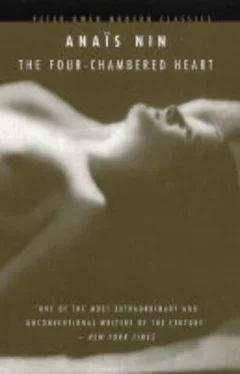Anaïs Nin - The Four-Chambered Heart
Здесь есть возможность читать онлайн «Anaïs Nin - The Four-Chambered Heart» весь текст электронной книги совершенно бесплатно (целиком полную версию без сокращений). В некоторых случаях можно слушать аудио, скачать через торрент в формате fb2 и присутствует краткое содержание. Год выпуска: 2004, ISBN: 2004, Издательство: Peter Owen Limited, Жанр: Классическая проза, Эротические любовные романы, на английском языке. Описание произведения, (предисловие) а так же отзывы посетителей доступны на портале библиотеки ЛибКат.
- Название:The Four-Chambered Heart
- Автор:
- Издательство:Peter Owen Limited
- Жанр:
- Год:2004
- ISBN:9780720611557
- Рейтинг книги:3 / 5. Голосов: 1
-
Избранное:Добавить в избранное
- Отзывы:
-
Ваша оценка:
- 60
- 1
- 2
- 3
- 4
- 5
The Four-Chambered Heart: краткое содержание, описание и аннотация
Предлагаем к чтению аннотацию, описание, краткое содержание или предисловие (зависит от того, что написал сам автор книги «The Four-Chambered Heart»). Если вы не нашли необходимую информацию о книге — напишите в комментариях, мы постараемся отыскать её.
The Four-Chambered Heart — читать онлайн бесплатно полную книгу (весь текст) целиком
Ниже представлен текст книги, разбитый по страницам. Система сохранения места последней прочитанной страницы, позволяет с удобством читать онлайн бесплатно книгу «The Four-Chambered Heart», без необходимости каждый раз заново искать на чём Вы остановились. Поставьте закладку, и сможете в любой момент перейти на страницу, на которой закончили чтение.
Интервал:
Закладка:
The paradise of her childhood had been in books.
The house in which she had lived as a child was the house of the spirit which does not live blindly but is ever, out of passionate experience, building and adorning its four-chambered heart—an extension and expansion of the body, with many delicate affinities establishing themselves between her and the doors and passageways, the lights and shadows of her outward abode, until she was incorporated into it in the entire expressiveness of what is outward as related to the inner significance, until there was no more distinction between outward and inward at all.
(I’m fighting a dark force in Rango, loving nature in him, through him, and yet fighting the destructions of nature. When my life culminates in a heaven of passion, it is most dangerously balanced over a precipice. The further I seek to soar into the dream, the essence, touching the vaults of the sky, the tighter does the cord of reality press my neck. Will I break seeking to rescue Rango? Fatigue of the heart and body…
Intermittently I see and feel the dampness, poverty, a sick Zora, food on the table with wine stains, cigarette ashes, and bread crumbs of past meals. Only now and then do I notice the rust in the stove, the leak in the roof, the rain on the rug, the fire that has gone out, the sour wine in a cup. And thus I descend through trap doors without falling into a trap but knowing there is another Rango I cannot see, the one who lives with Zora, who awaits to appear in the proper lighting. And I am afraid, afraid of pain… Now I understand why I loved Paul…because he was afraid. When we lay down and caressed each other we caressed this self-same fear and understood it, under the blanket, fear of violence. We recognized it in the dark, with our hands and our mouths. We touched it and were moved by it, because it was our secret which we shared through the body. Everyone says: you must take sides, choose a political party, choose a philosophy, choose a dogma… I chose the dream of human love. Whatever I ally myself to is to be close to my love. With it I hope to defeat tragedy, to defeat violence. I dance, I sew, I mend, I cook for the sake of this dream. In this dream nobody dies, nobody is sick, nobody separates. I love and dance with my dream unfurled, trusting darkness, trusting the labyrinth, into the furnaces of love. Some say: the dream is escape. Some say: the dream is madness. Some say: the dream is sickness. It will betray you. The Rango I see is not the one Zora sees, or the world sees. This is the witchcraft of love. You can take sides in religion, you can take sides in history, and there are others with you, you are not alone. But when you take the side of love, the opium of love, you are alone. For the doctors call the dream a symptom, the historians escape, the philosophers a drug, and even your lover will not make the perilous journey with you… Hang your dream of love on the mast of this barge of caresses…a flag of fire…)
The enemy was not outside as Rango believed.
What he most wanted to avoid, which was that Djuna should remember her days with Paul, or desire Paul’s return, or yearn for his presence, was the very feeling he caused by his violence.
Because his violence drove her away from him. The sense of devastation left by his angry words, or his distorted interpretations of her acts, his doubts, caused such an anxious climate that at times to escape from the tension, like a child seeking peace and gentleness, she did remember Paul…
Then Rango committed a second error: he wanted Djuna and Zora to be friends.
Djuna never knew whether he believed this would achieve a unity in his torn and divided life, whether he was thinking only of himself, or of sharing his burden with Djuna, or whether he had such faith in Djuna’s creation of human beings that he hoped she could heal Zora and perhaps win Zora’s affection and put an end tothe tension he felt whenever he returned home.
The obscurities and labyrinths of Rango’s mind remained always mysterious to her. There were twists and deformities in his nature which she could not clarify. Not only because he never knew himself what took place within him, not only because he was full of contradictions and confusions, but because he resented and rebelled against any examination, probing, or questioning of his motives.
Socame the day when he said: “I wish you would visit Zora. She is very ill and you might help her,”
Until now there had been very little mention of Zora. Certain words ofRango’s had accumulated in Djuna’s mind: Rango had married Zora when he was seventeen. Six years before he met Djuna they had begun to live together without a physical bond, “as brother and sister.” She was constantly ill and Rango had a great compassion for her helplessness. Djuna did not know whether more than compassion bound them together, more than the past.
She knew that this appeal was made to her goodself, and that she must, to answer it, subdue her own wishes not to be entangled in Rango’s life with Zora, and to avoid a relationship which could only cause her pain. She was being asked to bring a certain aspect of herself among her other aspects as others are asked to wear a certain costume out of their multiple wardrobe.
She was invited to bring her good self only, in which Rango believed utterly, and yet she felt a rebellion against this good self which was too often called upon, was too often invited, to the detriment of other selves who were now like numerous wallflowers! The Djuna who wanted to laugh, to be carefree, to have a love all of her own, an integrated life, a rest from troubles.
Secretly she had often dreamed of her other selves, the wild, the free, the natural, the capricious, the whimsical, the mischievous ones. But the constant demand upon the good one was atrophying the others.
But there are invitations which are like commands.
There are heraldic worlds of spiritual and emotional aristocracy which have nothing to do with conventional morality, which give to certain acts a quality of noblesse oblige, a faithfulness to the highest capacities of a personality, a sort of life on the altitudes, a devotion to the idealized self. The artists who had overthrown conventions submitted to this code and knew the sadness and guilt which came from any failing in this voluntary standard. All of them suffered at times from a guilt resembling the guilt of the religious, the moralists, the bourgeois, while apparently living in opposition to them. It was the incurable guilt of the idealist seeking to reach an image of one’s self one could be proud of.
They had merely created fraternities, duties, communal taboos of another sort, but to which they adhered at the cost of great personal sacrifices.
Djuna did not know how this good self had attained such prominence. She did not know how it had come to be born at all, for she considered it thrust upon her, not adopted by her. She felt much less good than she was expected to be. It gave her a feeling of treachery, of deception.
She did not have the courage to say: I would rather not see Zora, not know your other life. I would rather retain my illusion of a single love.
In childhood she remembered she played dangerous games. She sought adventures and difficulties. She fabricated paper wings and threw herself out of a second-story window, escaping injury by a miracle. She did not want to be the sweet and gentle heroine in charades and games, but the dark queen of intrigue. She preferred Catherine de’ Medici to the flavorless and innocent princesses.
She was often tangled in her own high rebellions, in her devastating bad tempers, and in lies.
But her parents repeated obsessionally: You must be good. You must keep your dress clean. You must be kind, thank the lady, hide your pain if you fall, do not reach for anything you want, do not attract attention to yourself, do not be vain about the ribbon in your hair, efface yourself, be silent and modest, give up to your brothers the games they want, curb your temper, do not talk too much, do not invent stories about things which never happened, be good or else you will not be loved. And when she was accused of any of these offenses, both parents turned away from her and she was denied the good-night or good-morning kiss which was essential to her happiness. Her mother carried out her threats of loss into games which seemed like tragedies to Djuna the child: once swimming in a lake before Djuna’s anxious eyes, she had pretended to disappear and be drowned. When she reappeared on the surface Djuna was already hysterical. Another time, in a vast railroad station, when Djuna was six years old, the mother hid behind a column and Djuna found herself alone in the crowd, lost, and again she wept hysterically.
Читать дальшеИнтервал:
Закладка:
Похожие книги на «The Four-Chambered Heart»
Представляем Вашему вниманию похожие книги на «The Four-Chambered Heart» списком для выбора. Мы отобрали схожую по названию и смыслу литературу в надежде предоставить читателям больше вариантов отыскать новые, интересные, ещё непрочитанные произведения.
Обсуждение, отзывы о книге «The Four-Chambered Heart» и просто собственные мнения читателей. Оставьте ваши комментарии, напишите, что Вы думаете о произведении, его смысле или главных героях. Укажите что конкретно понравилось, а что нет, и почему Вы так считаете.












